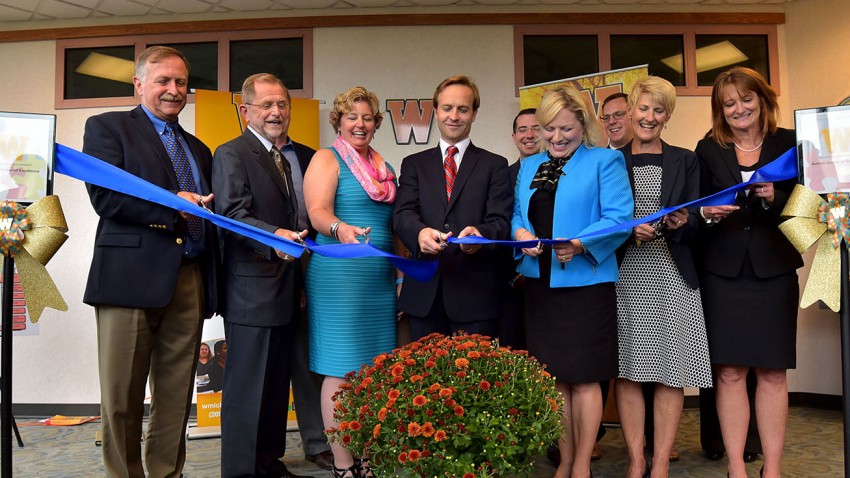
Legislators and University representatives participated in the Sept. 11 ceremony.
KALAMAZOO, Mich.—Michigan Lt. Gov. Brian Calley and a number of Michigan legislators and state officials were at Western Michigan University Sept. 11 to help open a major new resource for Michigan families—Western's Evaluation Center for Autism and Neurodevelopmental disorders—known as WECAN.
Located in WMU's Unified Clinics on the University's Oakland Drive Campus, the new center is part of WMU's multifaceted Autism Center of Excellence. Families will be able to visit WECAN and work with an interdisciplinary diagnostic team specializing in autism spectrum disorder to have children's skills assessed along with family needs. They'll receive a diagnosis along with individualized treatment recommendations, if appropriate. The assessment will be based on high-quality, autism-specific assessment tools, observation, interviews and the team's clinical expertise.
"Western Michigan University is the best in this field, anywhere in the nation and probably anywhere in the world," said Calley in his comments as he lauded the University's work in training professionals and providing services for children and families. "It totally changes the direction of people's lives...And Kalamazoo is way ahead of the curve in putting together partnerships and expertise together with the local educational system."
WMU Autism Center of Excellence
WECAN is one of several elements of the WMU Autism Center of Excellence, which was funded by a special $4 million appropriation by the Michigan Legislature that is administered through the Michigan Department of Health and Human Services. The funding for service and training is designed to increase Michigan's capacity to train professionals and expand services so that families will not have to wait so long for diagnosis and treatment. WECAN opened for client appointments on Monday, Sept. 14.
"This new center is an important tool that will allow our faculty and staff to put their worldwide reputation to work on behalf of families and schools in a way that will significantly move the needle as our state and communities work to improve both the quality and timeliness of autism-related services," said WMU President John M. Dunn. "Years of research and service in applying behavior analysis to the field will mean families will see an expansion of support and training that will improve quality of life."
Initiatives
WMU's Autism Center of Excellence is an umbrella organization under which a number of initiatives are designed to:
- Support and expand autism assessment and treatment services.
- Expand capacity to train graduate and undergraduate students in applied behavior analysis and other evidence-based educational and therapy approaches to autism.
- Improve the availability and quality of resources and continuing education support services for autism practitioners.
- Expand support services beyond childhood and adolescence to encompass adults and college students who are on the autism spectrum.
Mission
The mission of WECAN is to help accomplish the first of the four goals.
"WECAN will be equipped to deliver the "gold standard" of diagnostic evaluations and other assessments for children with autism," says Dr. Stephanie M. Peterson, chair of the psychology department, who with Dr. Wayne Fuqua, professor of psychology, co-directs the Autism Center of Excellence.
Peterson says the WECAN will have the advantage of bringing interdisciplinary teams to the evaluation task. Team members will include a licensed psychologist specializing in autism spectrum disorder and behavior analysis, a speech/language pathologist, an occupational therapist and a developmental pediatrician. A psychiatrist and social worker will also be on the team as needed. Dr. Ann Tyler will direct WECAN.
"WECAN will play a pivotal role in our southwest Michigan community and beyond by assisting both medical and educational professionals to identify the most efficient route to diagnosis for intervention eligibility and benefits," Tyler says.
The WECAN opening is the second major step in recent weeks in the development of WMU as a resource for autism related services. During August, WMU trustees approved the purchase of a new off-campus building to house the Kalamazoo Autism Center. That facility will provide the space needed for an education and treatment program for children diagnosed on the autism spectrum. The center is currently located in a smaller private facility.
For more news, arts and events, visit wmich.edu/news.
